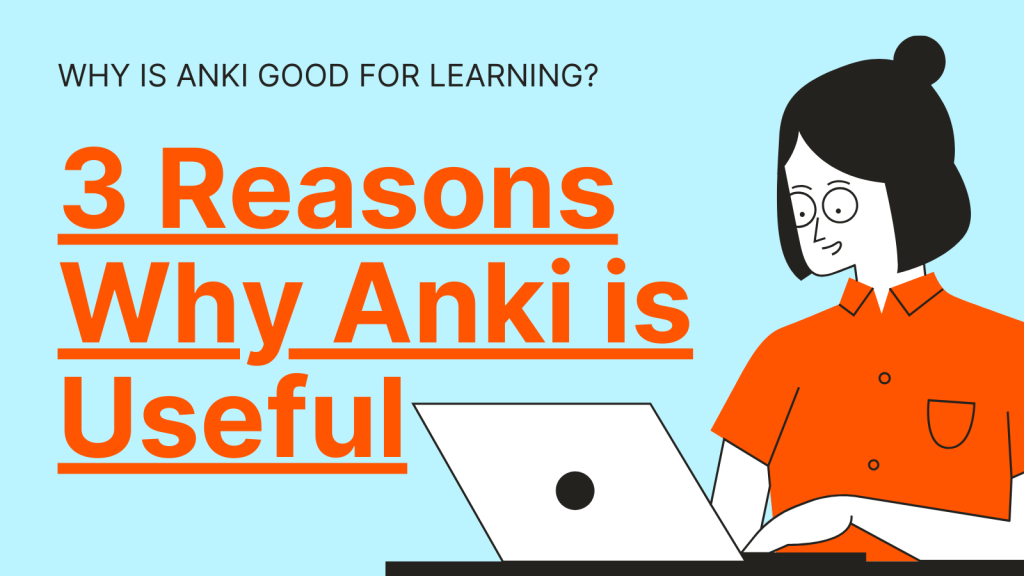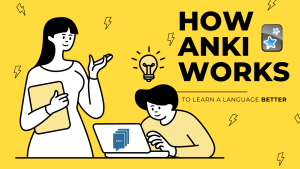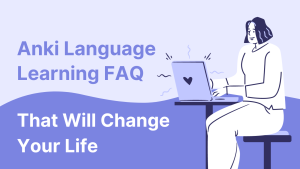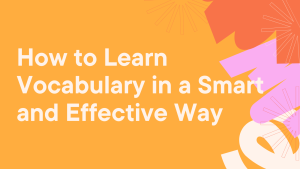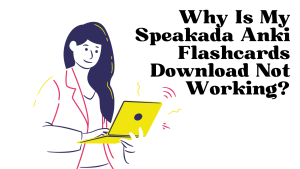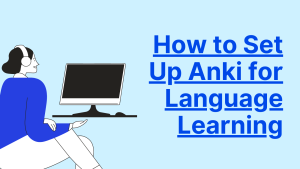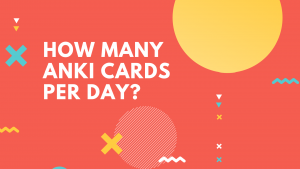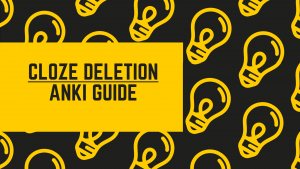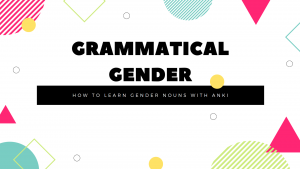Why is Anki Good for Learning?… 3 Reasons Why Anki is Useful
If you’re new to Anki, you might be wondering why is Anki good for learning?
On the surface, the Anki software may seem a little outdated, simple and janky. However, if you really use Anki effectively, it is the best tool out there to help you memorize and retain everything you want to learn. s
Like many other Anki users, I’m a strong believer in the use of Anki to learn and memorize a whole range of subjects. Whether it’s learning a language or studying for medical school, Anki is a great tool to help you keep certain information in your long-term memory.
In this article, we’ll first go through what is Anki. Then, we’ll discuss the reasons why you should use Anki for learning many topics, such as language learning or medical school.
What is Anki?
Anki is a flashcards software that is unique because it is a popular open-source software that has a built-in Spaced Repetition algorithm, with lots of case studies and research backing it up. Anki is based on an algorithm that tries to overcome some of the barriers and hurdles of our own brain’s memory limitations.
The Forgetting Curve & Anki’s Role in Long-Term Memory
If you try to simply remember even some basic details about your recent past, you will realize that you’ve probably forgotten most of those details.
Sure, as humans, we can be brilliant, intelligent, and creative. But when it comes to our ability to remember and retain information, we may face some problems.
Nevertheless, our brain is great at memorizing things when we use it the right way. This is particularly true if there’s a personal or profound connection to that information. But if it’s mundane, boring, or our brain decides it’s unnecessary to remember, we’re not going to remember it. This is because our brain’s capacity to hold information is limited.
If it were to store every single detail that happens to us, then we wouldn’t function very well. As a result, our brain gets rid of information that it sees as unimportant. Basically, whenever you learn new information, your brain’s ability to retain this information over time diminishes. Your brain decides what information is worth retaining, and what information is not worth retaining.
Hermann Ebbinghaus demonstrated this in his research. Ebbinghaus spent years researching memory and developed what is known as the Forgetting Curve. The Forgetting Curve is a graph that demonstrates the rate at which our memory decays overtime.
The Power of Anki’s Spaced Repetition Algorithm
In order to overcome the Forgetting Curve and the limitations of our brain, Anki tries to improve the use of our brain. When you use Anki, you can take advantage of Anki’s Spaced Repetition algorithm which tries to combat the fact that we forget things over time. It does this by strictly and meticulously reminding us to review information that we are about to forget. It manages the review schedule, which is key to unlocking the usefulness of Spaced Repetition. By doing so, we actually are able to remember information a lot more easily over the medium-term to long-term.
As part of Anki’s Spaced Repetition algorithm, Anki will automatically show flashcards that you’ve created and test whether you remember the answer or not. If you don’t remember the answer or get it incorrect, Anki will show you the flashcard more often until you do remember it well.
If you do remember what the answer is and get it correct, then the space of time when Anki will show you that particular flashcard gets bigger and bigger. This is because if we do remember it, then we don’t need to be reminded too often. However, if we do have trouble with that piece of information, then that interval (or “the space in which we’re reminded”) stays small.
Anki automatically works out the right time to show you flashcards and predicts when you might forget the answer by prompting a review on a flashcard.
Why is Anki Good for Language Learning?
Reason 1: Scientific Research Shows Anki’s Effectiveness
There’s actually a lot of academic papers that show that with space repetition, it does help improve our memories. In fact, recently there’s also been research that shows that using Anki can actually help us to improve grades in certain tests.
In the US, med students have been using Anki to memorize tens of thousands of medical information over years of learning. A research study in 2021 by Gary Dallaghan from the University of Texas, found that “Anki usage was associated with higher USMLE Step 1 scores. Additionally, amongst those who used Anki, those with more consistent use had higher USMLE Step 1 scores and higher perceived levels of knowledge retention. This research suggests that Anki is an effective educational tool that should be recommended to medical students alongside other evidenced-based study tools.”
Another research study in 2023 by Rae Hohle from the University of Minnesota found that “daily Anki use was correlated with increased Step 1 score” and that “there was an association between Anki use and increased sleep quality”. Overall, the study demonstrates potential benefits of daily use of Anki.
The use of Anki therefore can help in our learning and memorization and in some cases, can actually help us get the results of higher grades.
Reason 2: Several Case Studies of People in Many Industries have Shown Anki’s Positive Results
While we can just use the research to justify the use of Anki, there are a large number of testimonials and case studies of its positive results.
One example is in the game show ‘Jeopardy!’ where a contestant, Roger Craig actually used Anki to memorize thousands of questions and answers. As a result of using Anki, he won a total of $231,200 in his 7 days participation. Not long after, Arthur Chu played ‘Jeopardy!’ following Roger Craig’s use of Anki and won a grand total of $298,200.
Anki is also widely known in the medical space. Many pre-med and medical students will often use Anki in order to retain information particularly for medical exams. Shamim Ahmed is a fourth year medical student based in New York and like hundreds of other medical students, he highly recommends the use of Anki. “I’ve been using Anki since day one of medical school with great success. It has allowed me to have a life outside of studying by freeing up time for leisure, basketball, gymming and more on top of all the material we have to study for classes.”
Anki has been proven to be useful to allow students in other fields of learning such as law, programming, engineering and language acquisition, where vast amounts of content, facts and information are required to be memorized. Take for example, Derek Sivers, who is the founder of CD Baby Inc. Derek Sivers is a self-taught programmer and realized while working with ‘real’ programmers, that he actually forgot a lot of the programming language as soon as he learned it. “I wanted to deeply memorize the commands and techniques of the language, and not forget them, so that they stay at the forefront of my mind whenever I need them.” Sivers began using Anki as a way to memorize programming languages so he too could effortlessly program without a second guess. After reading many books and researching, he states that spaced repetition is “the most helpful learning technique I’ve found in 14 years of computer programming.”
So from these three case studies alone, it’s quite convincing how Anki is a great tool for any learner.
Reason 3: Anki is Open-Source, Mostly Free, Customizable, with a Strong Community
Another reason why Anki is so good for learning is the fact that Anki is free. It is an open source software meaning that you can go to the official website and download and use it without any cost to you. They have a Mac version, a PC version free and free Android version you can use on your smartphone. All of that is developed and maintained by the Anki community, which has been around for several years.
While Anki is technically free, the iPhone app is not. In order to use Anki on your iPhone, you’ll need to pay a one-time fee of $25. This may sound a lot compared to other apps available, but it really is the only software that does Spaced Repetition well. If you are still on the fence as to whether Anki is for you or whether it is worth paying $25 for, you could try it first on your computer for free.
In addition, the use of Anki is very customizable depending on what you are planning to learn. Because Anki is an open source software, there are many add-ons and plugins that can enhance your learning. For example, there are add-ons that help you track your progress, and others that help you make flashcards faster.
There are also pre-made Anki flashcards to help language learners specifically learn a foreign language. There are also free pre-med and med Anki flashcard decks to help medical students pass their exams.
The Bottom Line: Anki IS Useful & Good for Learning Many Things
Anki is a great tool that can help you learn and memorize just about anything. It is based on scientific research and there are hundreds of examples and case studies in which Anki has been used to retain large amounts of information.
Once you use Anki for relevant information that you want to learn, whether it’s languages or topics for a test, and you start memorizing the content over a period of time, you’ll find that you’ll memorize things at a rapid rate. This is why Anki is good and has been used by so many learners all over the world.
